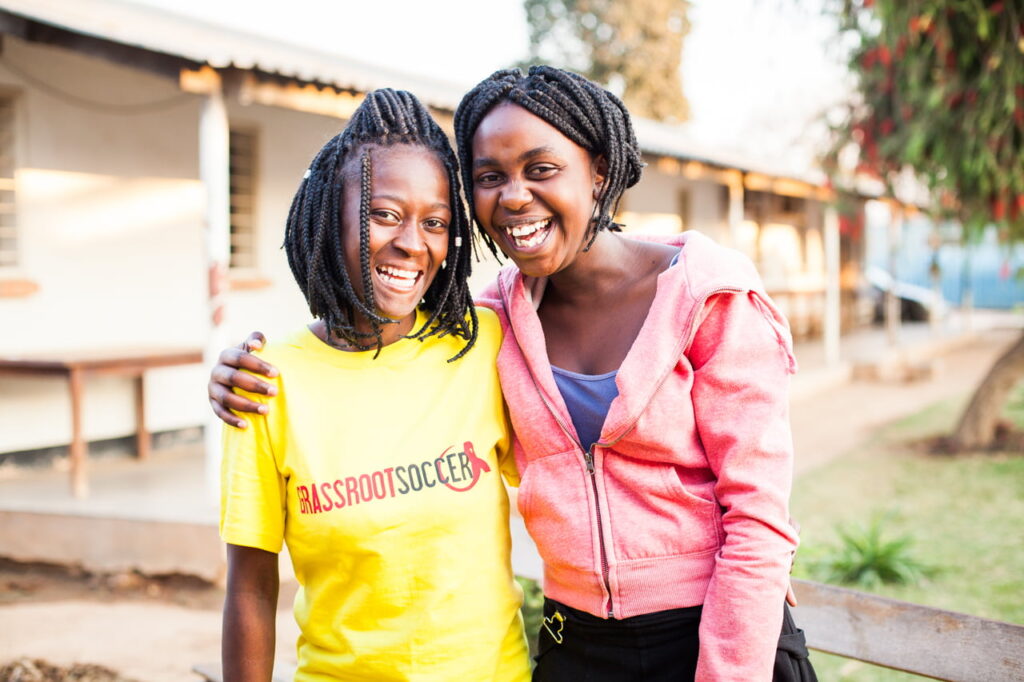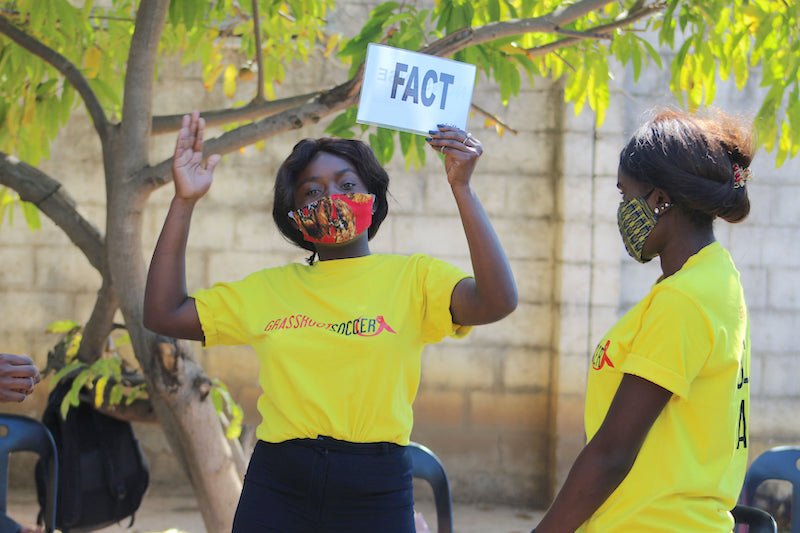Ensuring the Rights of Girls Through the Grassroot Soccer 3A’s Approach
On International Day of the Girl and amid an ongoing global pandemic, Grassroot Soccer (GRS) affirms its commitment to advancing the rights of adolescent girls and young women. The following piece is co-authored by Dr. Brian Brink and Maggie Musonda.

Prior to the COVID-19 pandemic, adolescent girls and young women faced many health challenges in southern Africa, particularly around sexual and reproductive health, HIV, and sexual violence. The pandemic has only exacerbated these challenges. The knock-on effects due to lockdowns and school closures are having an out-sized impact on adolescents, and unsurprisingly this is especially true for girls. For example, the IRC reports a 40% increase in teen pregnancies in Kenya, the UN has reported sharp increases in sexual violence in Ethiopia, Zimbabwe, Somalia, Kenya, Niger, and South Africa since COVID-19, and according to a report by PLAN International and the African Child Policy Forum, more than 120 million girls in Africa affected by school closures are at high risk of not returning when schools reopen.
At the heart of so many barriers facing adolescent girls and young women is a lack of respect for their fundamental rights around both their bodies and their minds. Issues of poverty, power, and ingrained gender norms are just a few of the societal factors that come into play. As a society, and particularly as men, we fail adolescent girls and young women when we don’t protect their rights. This includes their right to knowledge around their sexual and reproductive health, and their right to apply that knowledge as an expression of their sexuality. Acknowledging and protecting this right is a fundamental rule of respect that all men owe to all women.
Access to contraceptive services is one area where girls often face structural and societal barriers, rooted in a lack of respect for their right to decide for themselves. In mixed-sex intimate relationships, the power to decide when to use contraception, and what method, often does not rest with the female partner. The adverse consequence of this disrespect is seen in high teen pregnancy rates and disproportionately high HIV infection rates in adolescent girls and young women.
Another example is around adherence to antiretroviral treatment for HIV infection. Everyone is entitled to confidentiality and privacy around their HIV status and their decisions around disclosure and seeking treatment. Unfortunately, girls and young women are not always allowed to decide for themselves if they will receive ART; they may be pressured by a male partner to avoid treatment due to stigma.
This is where the Grassroot Soccer 3 A’s approach to adolescent health comes in. GRS provides girls with essential knowledge about sexual health, including HIV prevention, and the confidence to use it (Assets), helps them to Access services that they decide to use, and supports them in Adherence to treatment and healthy behaviors.
To see this in action, let’s take a closer look at what’s happening with GRS programming in one geography: Zambia.
Adolescent girls and young women (AGYW) in Zambia continue to disproportionately face various health, social and economic challenges as compared to young men of the same age. These have been compounded by the COVID-19 pandemic. When the pandemic hit, there was no platform for adolescent girls to access comprehensive sexuality education since schools were closed. There were no readily available sexual and reproductive health services, since most youth-friendly spaces were closed. Because of these unmet needs, they were left vulnerable and at heightened risk of unwanted pregnancies and HIV infections. Grassroot Soccer Zambia (GRSZ) recognized this call to action and rose to meet it by scaling up and re-designing effective programming around our 3 A’s. During the pandemic, most of our programs have been centered around ensuring that young people continue accessing sexual and reproductive rights and health information, and accessing related health services. GRSZ has ensured that adolescents continue making healthy decisions in the context of COVID-19 and continue receiving support and care, especially in the case of those living with HIV.

A notable challenge faced by adolescents during the pandemic is decreased access to essential health services. The consequences of reduced access are particularly severe for women and girls. Many adolescents living with HIV require regular access to health care, which can hinder their ability to comply with COVID-19 prevention precautions. Others have been deterred or delayed from seeking antiretroviral therapy due to reduced clinic hours and area hospitals being overwhelmed by COVID-19 patients. GRSZ has continued implementing SKILLZ Plus activities for adolescents living with HIV, by ensuring that they continue to receive care and support in health facilities while adhering to the Ministry of Health COVID-19 Prevention Guidelines.
Throughout the pandemic, GRSZ has safely advanced delivery of the 3 A’s to both adolescent girls and boys through conference calling, Zoom, and WhatsApp. In order to create better outcomes for girls, and for entire societies, it’s absolutely vital to reach boys with information about gender equality as well. By educating and mobilizing both girls and boys around gender equality and sexual and reproductive rights and health , programs build mutual respect for each other. When youth learn these values early on in life, they are more able to build gender equitable communities as adults.
These examples from Zambia are representative of Grassroot Soccer’s commitment to ensuring the sexual and reproductive rights and health of girls across all our programming and geographies. GRS seeks to build up the efficacy and agency of young people so they can have better lives in every respect, including health outcomes. When girls have power to make decisions around their health, and boys respect that power and support it, it creates a more gender equitable world–and that is a better world for everyone!
Dr. Brian Brink worked for the Anglo American Group of companies for 33 years and retired as Chief Medical Officer. In recognition of his contribution to the fight against AIDS in the private sector, Brink was awarded an honorary doctorate by the University of the Witwatersrand. He is a member of the Grassroot Soccer Global Board of Directors.
Maggie Musonda is a Project Manager with Grassroot Soccer Zambia, positively impacting the lives of thousands of Zambian youth each year. She has experience throughout the development sector, and is an accomplished activist working on gender equality and other elements of social and economic justice. Maggie holds a master’s degree in Peace, Leadership and Conflict Resolution from the University of Zambia in collaboration with Zimbabwe Open University.

